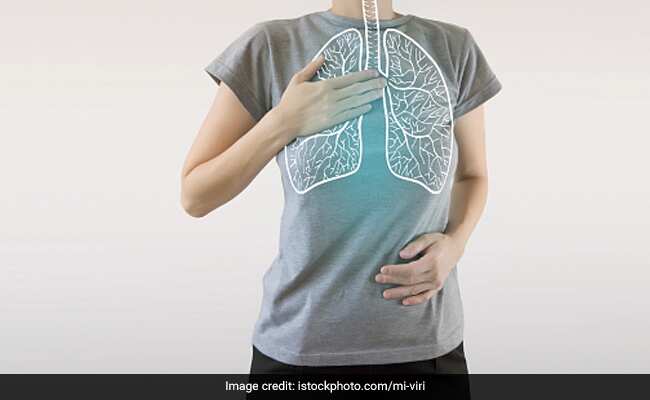A major concern in diagnosis of interstitial lung diseases is actually the "delay" occurring in the diagnosis. Only when the symptoms are overwhelming and interfering with the individual's routine, they approach a physician, believe experts.

Prompt screening and early diagnosis is the key to managing interstitial lung disease
Interstitial lung disease (ILD) is a group of lung disorders affecting gaseous exchange. This makes it difficult for an individual to breathe and perform his or her routine. It includes more than 100 disorders characterised by scarring (i.e., "fibrosis") and/or inflammation of the lung interstitium. Interstitium is the connective tissue between the air sacs or the alveoli and adjacent blood vessel and healthy interstitium is essential for gaseous exchange. One out of every six patients seen by a Pulmonologist or Chest specialist is suffering from ILD? Reference
"Prompt screening and early diagnosis is the key", mentioned by Dr (Col) S P Rai, when we asked what is the way out for an individual suffering from ILD. Dr (Col) S P Rai, Consultant, Pulmonary Medicine and Sleep Medicine, Kokilaben Dhirubhai Ambani Hospital specified that irreversible lung damage would have already occurred by the time individuals develop symptoms and reach to a pulmonologist. Major signs and symptoms associated with ILD include dry hacking cough, difficulty in breathing, swelling of fingertips (clubbing), generalized tiredness, weight loss etc. When we asked about how to differentiate symptoms of ILD from other lung diseases, he said, "The signs and symptoms of ILD in its early stage will be less severe and non-specific. The cough is dry (not associated with sputum or phlegm), becomes more and more persistent and disturbing with increase in disease severity. Similarly, breathing difficulty is more on exertion at the beginning but eventually worsens to an extent that, individuals suffer even while at rest. Other non-specific symptoms like generalized tiredness and weight loss occurring in patients goes unnoticed".

Consultant, Pulmonary Medicine and Sleep Medicine, Kokilaben Dhirubhai Ambani Hospital
When the cough is mild and less disturbing, individuals would refrain from consulting a physician. Dr P Shyamsunder Tampi, Senior Consultant Pulmonologist and Physician from Bombay Hospital, Mumbai said that, a major concern in diagnosis of ILD is actually the "delay" occurring in the diagnosis. Only when the symptoms are overwhelming and interfering with the individual's routine, they approach a Physician. In addition, Physicians should be vigilant to pick up early ILDs and refer them promptly to a Physician or Chest Physician. A collective effort by patients as well as General Physicians is essential to prevent overt lung function decline. Patients should consult a physician or chest specialist even for simple symptoms like persistent dry cough and breathlessness. There should be adequate awareness among general physicians to rule out ILD in every patient complaining of dry cough or breathlessness.

Senior Consultant Pulmonologist and Physician from Bombay Hospital, Mumbai
A thorough history, including smoking habit, occupational exposure details, pet birds /pigeon menace around the living area etc are essential to suspect ILD. Dr PS Tampi suggested awareness campaigns for an ILD as well, just like the ones for organized for Tuberculosis and Cancers. Educating patients on prodromal symptoms and General Physicians on picking up the disease at early stages will reduce the pernicious nature of the disease, thereby, improving survival and overall quality of life.
"Many conditions other than interstitial lung disease can affect your lungs, hence getting an early and accurate diagnosis is important for proper treatment", said Dr Jayalakshmi TK, Consultant Pulmonologist, Apollo Hospital, Belapur, Navi Mumbai. She said that survival in patients developing interstitial lung disease could be equated to normal individuals if picked up early and treated appropriately. It can also be as low as 2 to 3 years in certain ILDs even if adequate treatment is provided. Dr Jayalakshmi suggests that, "Patients having prodromal symptoms like persistent cough and breathing difficulties should undergo screening for ILD". Physicians and patients should be aware of other complications associated with ILD, like elevated pressure in blood vessels supplying the lungs. This would eventually cause right heart failure. Certain ILD patients can even remain asymptomatic until they develop overt right heart failure. Therefore, it is essential for any individual with persistent cough, breathing difficulty etc to get themselves screened for interstitial lung disease from their chest physicians.

Consultant Pulmonologist, Apollo Hospital, Belapur, Navi Mumbai
DoctorNDTV is the one stop site for all your health needs providing the most credible health information, health news and tips with expert advice on healthy living, diet plans, informative videos etc. You can get the most relevant and accurate info you need about health problems like diabetes, cancer, pregnancy, HIV and AIDS, weight loss and many other lifestyle diseases. We have a panel of over 350 experts who help us develop content by giving their valuable inputs and bringing to us the latest in the world of healthcare.














